The road ahead for Libya must be based on democratic government, respect for the fundamental principles of international law including freedom of association and expression, full equality between men and women and protection from discrimination, and the evolution of civil society, including democratic and representative trade unions. These principles must underpin the two stage process, announced by the interim authorities, of developing a new Constitution and holding Presidential and Parliamentary elections within 20 months.
Given the increasing evidence of atrocities both in the past and during the conflict, urgent action needs to be taken to ensure the full application of the rule of law, with proper investigation of alleged crimes and fair and open trials of those accused.
The ITUC is particularly concerned at evidence that Libyans and migrant workers from sub-Saharan Africa are being subjected to detention and repression for no other reason than the colour of their skin. The interim authorities must ensure that the human rights of all people in Libya are fully respected, and that in particular the most vulnerable are protected. At the same time, governments in countries to which people from Libya fled during the conflict must ensure that their rights are also fully respected in line with the relevant international standards. The destabilising effect of events in Libya on neighbouring countries must also be addressed.
The vast wealth amassed by the Gaddafi dictatorship belongs to the Libyan people. As much as $200bn dollars is believed to be controlled by the Libyan Investment Authority alone. The international community must give every possible assistance to the Libyan authorities to trace all the funds invested or appropriated by the former regime and ensure that they are used for the benefit of the people of the country in a fully transparent manner. In addition, effective measures must be put in place to avoid a “resource grab” by multinational corporations, many of which have done business with the Gadaffi dictatorship over the years.
A new and positive future beckons for the people of Libya; however, the road ahead will be difficult and challenging, with huge internal tensions to be overcome, and the real risk of external interests profiting from the country’s vast wealth at the expense of the people. Enabling the development of the full range of civil society institutions, including a strong, representative and vibrant trade union movement supported by good labour legislation and social dialogue, will be a crucial factor in ensuring genuine democracy and an economy that delivers for the many rather than the few.


